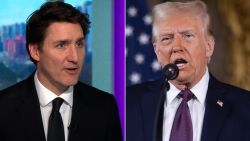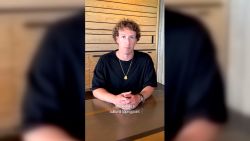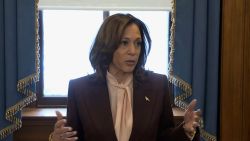Nearly three dozen of President-elect Donald Trump’s picks to serve in his incoming administration donated to his campaign or to the deep-pocketed outside groups that worked to elect him, a CNN analysis of federal campaign records shows.
They range from tech multibillionaire Elon Musk – who has emerged as the single largest, disclosed political donor of the 2024 presidential election – to others close to Trump tapped for key roles throughout government.
In all, eight of his Cabinet picks – led by Linda McMahon, the billionaire wrestling magnate Trump has selected to oversee the Education Department – and their spouses donated more than $37 million combined from their personal accounts to aid Trump, the review found, underscoring the proliferation of ultra-rich Americans now poised to shape US policy in the incoming second Trump administration.
(Two other Cabinet choices, New York Rep. Elise Stefanik and Florida Rep. Mike Waltz, transferred money from their campaign accounts to the pro-Trump effort.)
Musk has not been selected for a formal Cabinet job but is helping guide a new Department of Government Efficiency initiative and has played a pivotal role in the presidential transition – offering his views on job candidates, talking to world leaders and meeting with lawmakers on Capitol Hill as he weighs how to downsize the federal government.
In all, the SpaceX and Tesla chief executive donated more than $277 million to federal elections this cycle, the lion’s share of which – more than $262 million – benefited Trump. Most of Musk’s pro-Trump dollars flowed to a super PAC that the world’s richest man created to help turn out voters on the Republican’s behalf in key swing states.
Outside of self-funded presidential candidates, no individual has donated more to shape federal contests in a single election cycle, said Brendan Glavin, research director of OpenSecrets, a nonpartisan organization that analyzes money in politics.
Trump’s donors “are not just getting these sort of plum ambassadorships on the side,” Glavin said. “Major donors are getting positions that affect policy.”
The CNN analysis researched the more than 90 people that Trump had announced for high-level positions in the administration through Tuesday, which marked five weeks since his election victory. More than 30 of them had donated to his campaign or to one of the leading Trump-aligned outside groups, the review of FEC records found.
“Millions of Americans fed up with failure in the White House and federal government joined President Trump in the movement to restore our nation’s greatness. Some who will work with President Trump are among those millions of people who supported the campaign and helped the President win a decisive electoral victory,” Brian Hughes, a Trump transition team spokesman, said in a statement in response to CNN’s inquiry about donors joining the administration.
The total donations from Trump’s current Cabinet picks marks a surge from Trump’s first term. Five members of his original Cabinet had donated nearly $8 million to his committees or to the major outside groups supporting him, a review of campaign reports shows.
Donations from McMahon, who served as Trump’s SBA administrator in his first White House term, accounted for more than 90% of that total in the 2016 election.
The sums spent to aid Trump in 2024 far exceed the donations that President Joe Biden’s Cabinet members contributed to help him win the White House in 2020, FEC records show.
A dozen members of Biden’s Cabinet reported donations to his campaign or major super PACs involved in the 2020 election, giving less than $100,000 in total.
Billionaires in the administration
Musk’s spending dwarfed that of other supporters.
McMahon was the largest donor among Trump’s Cabinet picks and the second most generous contributor, after Musk, among the administration members announced through Tuesday, the review found.
Most of the $21.2 million she donated went to Make American Great Again, Inc., the main Trump-affiliated super PAC that spent heavily on advertising to aid his campaign.
Other seven-figure donors among Trump’s Cabinet picks include Cantor Fitzgerald chief Howard Lutnick, whom Trump has tapped to serve as Commerce secretary; Scott Bessent, the hedge fund executive Trump has selected to oversee the Treasury Department; and former Georgia Sen. Kelly Loeffler, his choice to head the Small Business Administration.
Loeffler’s husband, Jeff Sprecher, also was a major donor, contributing more than $2 million to the pro-Trump MAGA Inc. super PAC and Trump’s joint fundraising committee.
Sprecher is the CEO of the Intercontinental Exchange, which owns the New York Stock Exchange, and was at Trump’s side when the president-elect rang the opening bell at the exchange Thursday.
In an email, Loeffler’s communication director Caitlin O’Dea said, “Senator Loeffler is proud to be one of President Trump’s strongest supporters for the same reason a historic landslide of Americans voted to put him back in the White House: he will restore American prosperity, security, and opportunity.”
The billionaire embrace marks a turnaround of sorts for Trump, who saw corporate America recoil from him after the violent January 6, 2021, attack on the US Capitol. And he has seen new support from tech leaders who are pushing for fewer regulations from the federal government.
The staggering sums spent by Musk in this year’s election helped Trump close the financial advantage of his Democratic rival, Vice President Kamala Harris, who swiftly raised $1 billion after becoming her party’s standard-bearer in late July.
Super PACs face no limit on the size of donations they can receive or spend, but technically are not allowed coordinate their advertising decisions with the candidates they support.
However, a ruling this year by the FEC granting campaigns the ability to coordinate with outside political action committees on paid canvassing efforts freed up Musk to guide a ground game for Trump.
“The campaign finance system is a joke,” said Fred Wertheimer, who heads the Democracy 21 watchdog group and is a longtime advocate for limits on money in politics. “Musk is the example now of how campaign finance laws have failed.”
He said he worries about government departments led by billionaires who have no “interest in doing the job that the agency was assigned.”
Musk did not respond to inquiries from CNN.
But Tom Davis, a former congressman from Virginia who chaired the House Republicans’ campaign arm for several years, argues “there is nothing inherently wrong about people who made a lot of money wanting to give back through government.”
“The fact that they have contributed shows a degree of loyalty,” he added.
Friends and family
Presidents often reward donors and allies with plum positions – often dispatching them to glamorous, low-conflict posts in Europe or the Caribbean.
Some of Trump’s early picks for ambassadorships follow that pattern and include billionaires who donated to his reelection effort. Among them: Arkansas investor Warren Stephens, named as the US’ envoy to the UK, and Charles Kushner, Trump’s choice for ambassador to France – one of several extended family members or close friends who has been chosen for diplomatic gigs.
Kushner, who donated $2 million to pro-Trump efforts and received a presidential pardon at the end of Trump’s first term, is the father-in-law of Trump’s daughter, Ivanka. Another donor, Tom Barrack, who oversaw the fundraising for Trump’s first inauguration, is his choice as ambassador to Turkey.
And incoming special envoy to the Middle East, real-estate tycoon Steve Witkoff, is a longtime Trump friend and a partner in the cryptocurrency businesses that Trump launched with his sons earlier this year.
He donated $250,000 to a pro-Trump super PAC.























